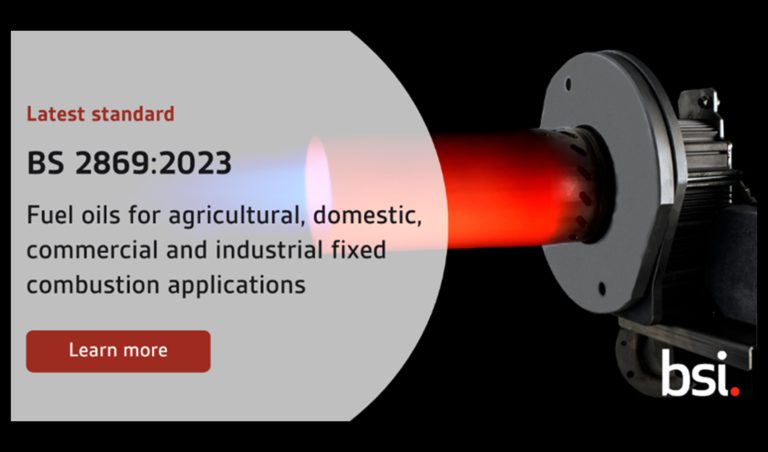
BS 2869:2023 is a crucial standard for businesses in the fuel industry, defining the quality of fuel oils for use in fixed combustion applications. By adhering to the revision, businesses can enhance their risk management strategies, improve operational efficiency, and instil greater confidence in fuel quality among their stakeholders.
Providing a framework for fuel producers, refiners, blenders, distributors, equipment manufacturers, designers, and end-users the standard ensures the appropriate fuel oils for the equipment and applications are being used. It can also support businesses in entering new markets by ensuring compliance with the latest regulations.
The benchmark for fixed combustion
In publishing the revised standard BSI emphasises the importance of ensuring that whatever fossil fuels are used during the transition are used as efficiently, effectively and safely as possible. With the industry focussed on the route to net zero 2050, the revised standard sets the benchmark for fixed combustion fuel quality to enable these goals to be achieved.
At the same time, the liquid fuel industry is working with BSI and CEN to facilitate the uptake of currently available renewable fuels, such as FAME (compliant with BS EN 14214) and paraffinic fuels (compliant with BS EN 15940).
With a vital focus on sustainability, PAS 5420:2023, the specification for sustainable bioliquid fuels for use in fixed combustion applications for heating, hot water and cooking was recently published. PAS 5420 enables the adoption of alternative bioliquid fuels to displace fossil fuels in the fixed combustion market without creating additional direct or indirect negative impacts on the environment via land use change, ecology and greenhouse gas emissions.
Whilst this is happening, second- and third-generation waste-derived liquid fuels are being developed, for which future CEN and BS EN standards (including UK forewords and annexes) may be required.
Addressing the impacts of decarbonisation
Author of the new standard, Alan Black, principal consultant, Oil Heating Consultancy Services Ltd, explains the need for the revisions: “BS 2869: 2023 as we know it today has been in use for the last 40 years or more, providing specifications for fuel oils derived from crude oil.
“Historically, it covered applications including on- and non-road automotive, industrial engines, burners and boilers with fuel specifications aligned with other applications not covered by this standard, such as marine and aviation fuels. This gave rise to a wide specification of fuels with which historic high emission low-efficiency engines, burners, etc. functioned adequately well.”
“Numerous amendments have been made to the standard over the last 40 years to account for both UK and EU requirements, the growing focus on reduction of harmful emissions and the adoption of bio-liquids as a proportion of some fuels.
“This latest full revision of BS 2869 provides detailed, application-specific, fuel oil specifications to reflect the need for changes in end users’ equipment, legislation, market use and the application specific use of fuel oils and fuel oil blends – this being in the best interests of safety and the environment during the process of decarbonisation.”
To learn more about the updates, please visit BSI website: BS 2869:2023 – TC | 31 Jul 2023

